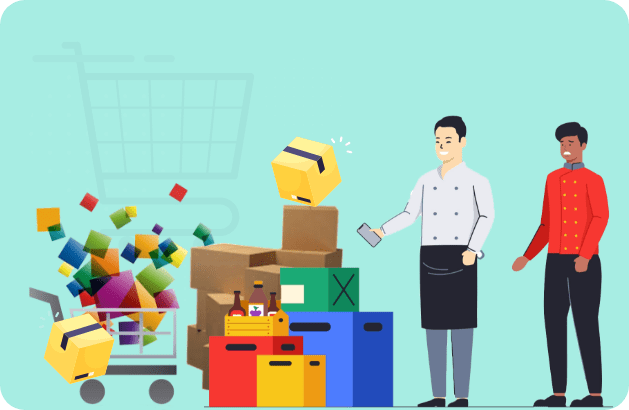Introduction
Electronic commerce is buying and selling of products through online services. In E-commerce for wholesale the products are sold in bulk from the e-commerce site instead of selling individually to each person. Wholesale reduces the cost of doing business and is intermediate between manufacturer and retailer. Since items are sold in bulk there might be larger orders. So the products can be sold quickly without much need for marketing. Ecommerce for wholesale is completely new but it is growing fast these days. There is a trigger in growth because of the increase in internet connection and smartphone use
Overview of market share
The global ecommerce market size was valued at USD 6.64 trillion in 2020 and is expected to grow by a compound annual growth rate (CAGR) of 18.7% from the period 2021 to 2028. The COVID-19 pandemic brought about a shift in wholesale dealer’s preference for online shopping, creating avenues for growth. The factors that affected ecommerce business outlook are the changes in consumer behaviour, increase in order quantity, physical stores closure and disruption in supply chain While retail sales dipped in 2020, e-commerce sales witnessed a surge. Several businesses are now focused on moving their customer online
Established organizations and large enterprises are moving towards online business due to lesser expenditure in communication and infrastructure. E-commerce offers the organization an easier reach for the dealers/customers, and hence necessary exposure to business is also achieved. Nowadays, the marketing options are in abundance due to the popularity of social media applications, which helps in driving the market for e-commerce towards a growth path
How e-commerce for wholesale dealers Works
In wholesale e-commerce, the products are sold in bulk and the wholesaler is the middle man in the supply chain which starts from Producers. The wholesale dealers buy the product in bulk from a manufacturer or dealer through their online site. Here the dealer places his order for products on the website. The concerned organization will process the order and supply the goods to the wholesale dealer. It is then sold to another wholesale dealer or directly to the consumers
What are the best features to have in e-commerce for wholesale
Some of the best to have features of wholesale eCommerce are
Payment Flexibility
The payment gateway and the payment options offered will all make a difference in the success of a business. Users of e-commerce websites should have payment flexibility. They should be able to pay in any way that will work for them. A payment gateway with advanced functionalities should be integrated to support the business and its growth
Easy to Use checkout feature
Adding items to the cart and then checking them out to proceed with payment must be an easy process. In case the checkout feature is too complicated the buyer may feel irritated and abort the process of buying products. So this should be easy to use a feature
Ease of Navigation
The key to the success of any e-commerce website is east to Navigation. The navigation should be easy, clear, and user-friendly. Extreme care should be taken while designing and developing the User Interface (UI). Clear navigation will improve the User Experience (UX) which will attract more users
User Reviews
Most people who shop on the website read the reviews before purchasing the product. People think that negative reviews will diminish sales. But it is actually not true. It is often positive to have negative reviews. When there are only positive reviews people think that they are fake. When there are true reviews, it will attract more people to the website
Security
The e-commerce platform should be secure for the users. Using features like an SSL certificate for a secure connection between user and e-commerce site, firewall to provide a gateway between networks and allow only authorized traffic, two-factor authentication for a user to log in would be ideal for any e-commerce site
Tech Stack
Front end for E-commerce
The front end for an e-commerce website can be developed using JavaScript libraries like Angular or React, CSS, HTML
Back end for E-commerce
The programming languages used for server-side coding are C#, PHP, and Python. Depending on the requirement of the project and the goals of the business-appropriate language is selected
Third-party Services
The e-commerce website needs to be integrated with third-party services like payment gateways, shipping modules, CRM, and analytics tools for the effective functioning of the e-commerce site

